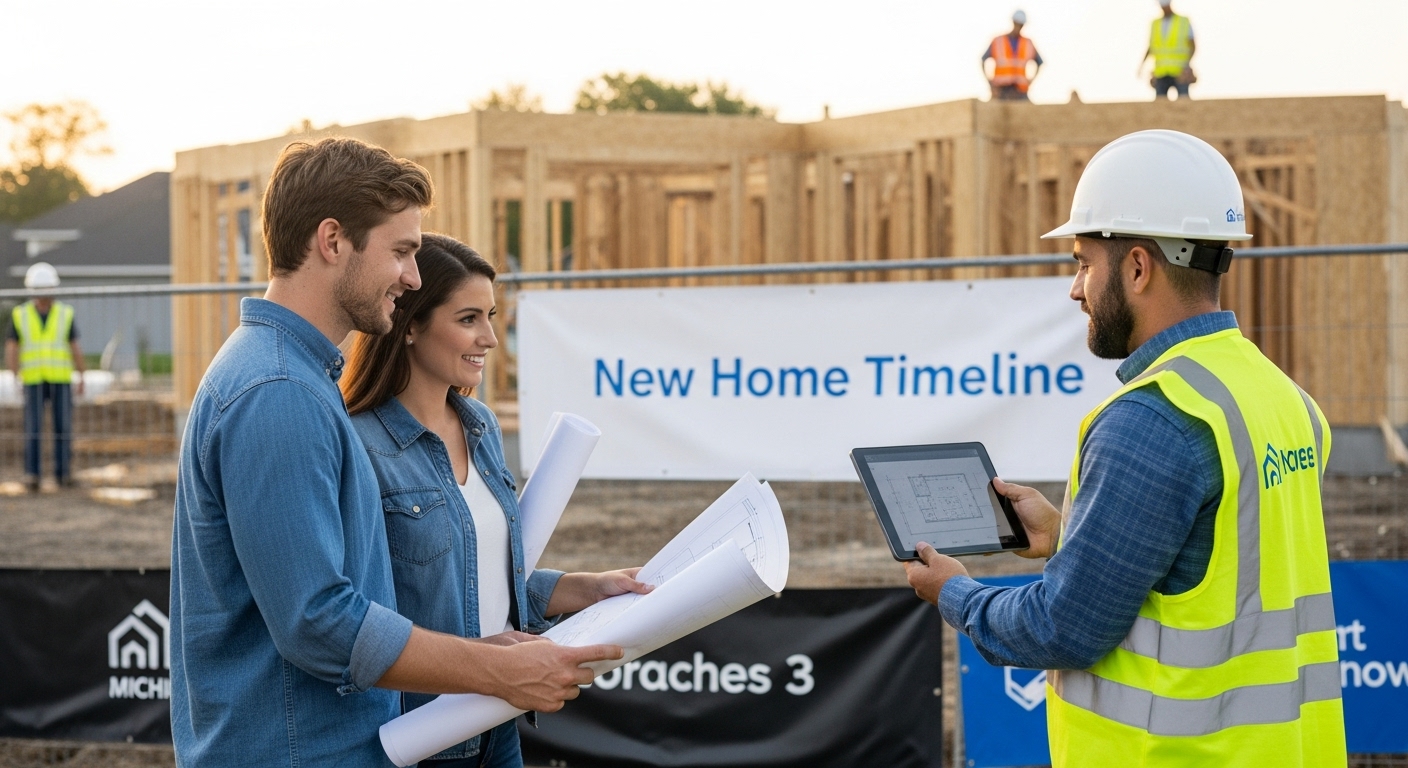Understanding the Building a New Home Timeline

Building a new home is much more than picking out paint colors and floor plans. The process actually unfolds across phases that can stretch anywhere from 7 to 12 months in Oakland County, Michigan alone. Most people expect delays and paperwork, but few realize that over 91 percent of construction managers have reported delays due to unexpected site and resource issues. The real surprise is that a well-mapped timeline—not the blueprints—often becomes the ultimate tool that decides whether your dream home is ready on time or drags on for months longer.
Table of Contents
- What Is The Building A New Home Timeline?
- Why Understanding The Timeline Matters?
- How The Home Building Timeline Works
- Key Phases In The Building Process
- Real-World Considerations And Challenges
Quick Summary
| Key Point | Explanation |
|---|---|
| 1. Define Your Home Buying Criteria | Clearly outline financial and lifestyle priorities to facilitate the home buying process. |
| 2. Conduct Thorough Neighborhood Research | Use online tools and local insights to analyze neighborhood characteristics and market trends. |
| 3. Secure Financing and Set a Realistic Budget | Assess your financial situation and obtain pre-approval to create a budget that aligns with your goals. |
| 4. Develop a Targeted House Hunting Strategy | Assemble a knowledgeable team and use technology to streamline property searches effectively. |
| 5. Evaluate Each Property Systematically | Perform detailed assessments of homes to identify potential issues and ensure sound investment choices. |
What is the Building a New Home Timeline?
The building a new home timeline represents a comprehensive journey that transforms architectural vision into physical reality, spanning multiple intricate phases from initial conception to final occupancy. Unlike purchasing an existing property, constructing a new home involves a complex, multifaceted process that requires strategic planning, precise coordination, and significant investment of time and resources.
Understanding the Home Construction Process
A building a new home timeline typically encompasses several critical stages that progressively evolve from conceptual design to tangible structure. According to the Pennsylvania Builders Association, this process can generally be broken down into distinctive phases that ensure systematic progression and quality control:
- Research and Planning: Determining home priorities, design preferences, location requirements, and establishing a comprehensive budget
- Pre-Construction Preparation: Securing financial approvals, finalizing architectural plans, and obtaining necessary municipal permits
- Structural Development: Constructing foundational elements, framing the primary structure, and installing critical infrastructure systems
Key Timeline Considerations
The duration of building a new home can vary significantly based on multiple factors, including geographic location, complexity of design, local building regulations, and available resources.
In Oakland County, Michigan, where local building codes and climate conditions play crucial roles, homeowners should anticipate a timeline ranging from 7 to 12 months for complete project completion.

Key variables that influence the building timeline include:
- Lot preparation and site work complexity
- Custom design specifications and architectural intricacies
- Availability of construction materials and skilled labor
- Weather conditions and seasonal limitations
- Municipal permit processing and inspection schedules
Understanding this timeline helps potential homeowners in areas like Farmington Hills, Novi, and West Bloomfield set realistic expectations and prepare financially and emotionally for the home construction journey. Engaging with experienced local professionals who understand Oakland County’s specific real estate landscape can provide invaluable guidance throughout this transformative process.
Why Understanding the Timeline Matters?
Understanding the new home building timeline is crucial for homeowners, serving as a strategic roadmap that helps manage expectations, mitigate potential challenges, and ensure a smooth construction process. The complexity of building a home extends far beyond merely constructing a physical structure it involves intricate financial, legal, and logistical considerations that can significantly impact overall project success.
Financial Planning and Risk Management
A comprehensive timeline provides homeowners with critical insights into financial requirements and potential expenditure fluctuations. According to the American Planning Association, knowing the precise stages of construction allows for more accurate budgeting and helps prevent unexpected financial strain.
Key financial considerations include:
- Understanding cash flow requirements at each construction phase
- Anticipating potential additional costs for unexpected modifications
- Planning for interim living expenses during construction
- Managing construction loan drawdown schedules
Navigating Regulatory and Logistical Challenges
In Oakland County, Michigan, where local building regulations can be complex, understanding the timeline helps homeowners proactively manage potential regulatory hurdles. This knowledge enables more effective communication with contractors, architects, and municipal authorities, reducing delays and minimizing potential legal complications.
Critical logistical aspects homeowners must consider:
- Permit acquisition and inspection scheduling
- Coordinating multiple professional services
- Managing potential weather-related construction interruptions
- Aligning personal and professional schedules with construction milestones
By comprehensively understanding the building timeline, homeowners in areas like Farmington Hills, Novi, and West Bloomfield can transform what might seem like an overwhelming process into a structured, manageable journey. Professional guidance from local real estate experts who understand the nuanced Oakland County market can provide invaluable support throughout this transformative experience.
How the Home Building Timeline Works
The home building timeline operates as a meticulously orchestrated sequence of interconnected stages, each requiring precise planning, specialized skills, and strategic coordination. Unlike traditional home purchasing, new construction demands a dynamic approach that transforms architectural concepts into tangible living spaces through carefully executed processes unique to residential development.
Foundational Planning and Design Phases
According to the National Association of Home Builders, the initial stages of home construction involve comprehensive preparatory work that sets the foundation for successful project completion. This critical preliminary phase encompasses several essential components:
- Site selection and land assessment
- Architectural design and blueprint development
- Comprehensive feasibility and soil testing
- Initial budget and financing arrangements
- Preliminary permit and zoning evaluations
Sequential Construction Progression
The home building timeline follows a structured progression where each phase builds upon the previous one, creating a systematic approach to residential construction. In Oakland County, Michigan, this process typically unfolds through interconnected stages that require meticulous attention to detail and professional expertise.
Key sequential stages include:
- Site preparation and foundation establishment
- Structural framing and exterior shell construction
- Mechanical systems installation (electrical, plumbing, HVAC)
- Interior finishing and trim work
- Final inspections and occupancy certification
Professional builders in regions like Farmington Hills and Novi understand that successful home construction requires not just technical skill, but also exceptional project management. The timeline demands continuous communication, precise scheduling, and adaptability to potential challenges that may emerge during the building process.
By comprehending the intricate mechanics of home construction timelines, homeowners can effectively collaborate with builders, anticipate potential complexities, and contribute to a smoother, more predictable building experience. The key lies in understanding that each stage represents a critical milestone in transforming architectural vision into a tangible, livable space.
Key Phases in the Building Process
The home building process represents a complex journey that transforms architectural blueprints into tangible living spaces through carefully orchestrated stages. Each phase demands specialized expertise, precise coordination, and strategic implementation to ensure successful project completion. Understanding these critical stages helps homeowners navigate the intricate landscape of new home construction with confidence and clarity.
Pre Construction Preparation
According to the U.S. Department of Housing and Urban Development, the initial stages of home construction involve comprehensive planning that establishes the foundational framework for the entire project. This critical preparatory phase encompasses several essential elements:
- Comprehensive site evaluation and land assessment
- Detailed architectural design and blueprint development
- Securing necessary financial approvals and construction financing
- Obtaining required municipal permits and zoning clearances
- Conducting comprehensive soil and environmental testing
Structural Development Stages
The structural development phase transforms conceptual designs into physical reality, requiring meticulous attention to detail and expert craftsmanship. In Oakland County, Michigan, this process involves a systematic approach that builds the home from its most fundamental elements to its final refined state.
Key structural development stages include:
- Site preparation and ground leveling
- Foundation pouring and initial structural framing
- Exterior shell construction and weatherproofing
- Installation of primary mechanical systems
- Roofing and exterior finishing work
Professional builders in regions like Farmington Hills and Novi understand that each phase represents a critical milestone in home construction. The process demands not just technical skill, but also exceptional project management, continuous communication, and the ability to adapt to potential challenges that may emerge during building.
By comprehending the nuanced mechanics of home construction phases, homeowners can actively participate in the building process, make informed decisions, and work collaboratively with construction professionals to bring their architectural vision to life. The key lies in recognizing that each stage is an integral part of transforming an empty lot into a personalized, functional living space.

Real-World Considerations and Challenges
Building a new home extends far beyond architectural blueprints and construction timelines, encompassing a complex network of real-world challenges that can significantly impact project success. Homeowners must navigate an intricate landscape of technical, financial, and logistical obstacles that require strategic planning, adaptability, and comprehensive understanding.
Project Management and Operational Complexities
According to research from Park University, construction projects frequently encounter substantial challenges that can derail timelines and increase overall costs. In 2022, an overwhelming 91% of construction managers reported project delays, with critical factors including:
Understanding the most frequent sources of construction delays can help homeowners prepare for potential challenges. The table below highlights key causes of delays and the percentage of managers affected, according to industry research referenced in the article.
| Cause of Delay | Description | Reported by Construction Managers |
|---|---|---|
| 1. Site or Resource Issues | Unexpected site complications or shortages that hinder project progress. | 91% |
| 2. Unrealistic Initial Project Planning | Inaccurate timelines or underestimated project scope, leading to overruns. | 91% |
| 3. Resource Allocation Constraints | Limited availability of critical materials or skilled labor. | 91% |
| 4. Supply Chain Disruptions | Delays in the delivery of essential building materials and equipment. | 91% |
| 5. Environmental or Weather Complications | Severe weather events or site-specific conditions that interrupt construction. | 91% |
Table: Top 5 causes of construction project delays frequently reported by construction managers in Michigan real estate developments.
- Unrealistic initial project planning
- Resource allocation and availability constraints
- Unexpected site or environmental complications
- Supply chain disruptions
- Labor shortages and skilled workforce limitations
Financial and Regulatory Navigational Challenges
Home construction in Oakland County, Michigan, demands meticulous financial and regulatory navigation. Homeowners must anticipate and proactively address potential challenges that can emerge throughout the building process. These challenges often require sophisticated understanding of local regulations, zoning requirements, and potential financial fluctuations.
Critical financial and regulatory considerations include:
- Managing construction loan requirements and drawdown schedules
- Navigating complex municipal permit processes
- Addressing potential zoning and land use restrictions
- Understanding local building code compliance requirements
- Managing unexpected cost overruns and budget adjustments
Professional builders in regions like Farmington Hills and Novi recognize that successful home construction demands more than technical expertise. It requires exceptional communication, strategic problem solving, and the ability to anticipate and mitigate potential challenges before they escalate.
By understanding these real world considerations, homeowners can approach their building journey with greater confidence, preparedness, and realistic expectations. The key lies in maintaining flexibility, developing robust contingency plans, and working collaboratively with experienced professionals who understand the nuanced landscape of residential construction.
Take the Stress Out of Your Home Building Journey in Oakland County
Building a new home is a rewarding path, but understanding the full timeline and navigating unexpected challenges can create uncertainty and concern. Many homeowners feel overwhelmed by complex permit processes, local regulations, financial planning, and balancing their dream with real-world constraints discussed in our article. You do not have to navigate these hurdles alone. Tom Gilliam, a trusted Realtor® with over 20 years of local expertise, helps you manage each construction phase so you avoid costly setbacks and delays in Farmington Hills, Novi, West Bloomfield, and beyond. Explore how our proven strategies, deep market knowledge, and personalized support can lead you to a seamless new home experience, from initial plans to move-in day.

Let us help you turn your vision into reality with clarity and confidence. Visit Tom Gilliam – RE/MAX Classic to get tailored support for all your Oakland County new build questions or connect directly for a personal consultation. Start your home building adventure now with a local expert who puts your goals first.
Frequently Asked Questions
What are the main phases of building a new home?
The main phases of building a new home include research and planning, pre-construction preparation, structural development, and final inspections. Each phase is essential for ensuring a smooth construction process.
To help clarify the main stages involved in building a new home, the following table summarizes each phase and its primary activities as described in the article.
| Phase | Key Activities |
|---|---|
| 1. Research and Planning | Identify home priorities, design preferences, choose the right location, and establish a detailed budget. |
| 2. Pre-Construction Preparation | Secure financing, finalize building plans, and obtain required permits and zoning approvals. |
| 3. Structural Development | Build the foundation, frame the structure, and install core systems including electrical, plumbing, and HVAC. |
| 4. Interior Finishing | Complete flooring, trim work, cabinetry, painting, and fixture installations for a finished look. |
| 5. Final Inspections & Closing | Pass municipal inspections, receive occupancy certification, and finalize the ownership transfer. |
How long does it typically take to build a new home?
The timeline for building a new home can range from 7 to 12 months, depending on factors such as location, design complexity, and local building regulations.
What financial considerations should I keep in mind while building a new home?
Homeowners should plan for cash flow requirements at each construction phase, anticipate potential additional costs for modifications, and budget for interim living expenses during construction.
How can I manage regulatory challenges during the home building process?
Understanding local building regulations, securing necessary permits, and maintaining effective communication with contractors and municipal authorities can help homeowners navigate regulatory challenges effectively.
Recommended
- Mortgage Tips Archives - Homes2MoveYou.com
- MichiganPropertyInvestment Archives - Homes2MoveYou.com
- mortgage advice Archives - Homes2MoveYou.com
- Novi MI real Estate Archives - Homes2MoveYou.com
- Understanding the Timeline for Moving House - Schott Removals
- Understanding the Ownership Transfer Timeline for Vacation Properties – Complete Transfers




